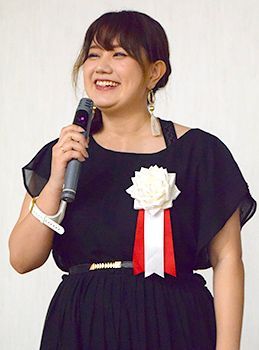Emi Tamaki talks about her life of research at Ryudai 21st Century Forum

“Since I was a shut-in, I wanted to make a system that would allow me to share my body with someone else,” says Tamaki at the forum at the University of the Ryukyus
June 8, 2018 Ryukyu Shimpo
At the “Ryudai 21st Century Forum” held recently at the University of the Ryukyus in Nishihara Town as a place of interaction between academia and society attended by students and employees of various companies, Emi Tamaki, Associate Professor at Waseda University’s Graduate School of Creative Science and Engineering, addressed a packed room filled with raptly listening teachers, students, and other attendees.
She talked about her “three-legged life,” which includes her research in “Body Sharing” technology – which uses a computer to help people move their bodies, managing a company, and teaching.
The term Body Sharing was coined by Tamaki. Tamaki, who “didn’t like to go out and is a homebody,” conceived of a system that would send out a robot or another person in their place and would allow them to share the sensations of various experiences, that would include not only sound and sight, but also touch and feel.
In 2011 while at Tokyo University Graduate School, Tamaki debuted her “possessed hand,” which used a computer to move the hand of a person with hyposthenia.
She then studied using a computer to send electric signals to move muscles, and shocked the world after developing a system that used that technology to move fingers via electrodes attached to a person’s forearm, and started receiving a lot of requests to use the technology.
To put this into mass production, Tamaki founded the company H2L with a friend in 2012. In order to get her company off the ground, she started looking for partnerships with manufacturers, continuing her research while splitting the workload with her friend, and in order to increase her business opportunities started attending studying up on international affairs and business practices, and attending workshops.
While her goal was to share the human body experience, there were many people who are hesitant. Wondering where this would fit the needs of and be accepted into society, her focus was drawn to virtual reality gaming.
She released a well-received stress reliever game called “Mother Madness” where, using a controller that looked like a watch, the player would move their arm and on screen the mother would destroy objects in a house, with the player seeing how much damage they can do.
Currently, Tamaki continues to research the dangers and psychology of operating in a virtual world, looking to develop and promote new things.
She gave a shout out to the students in attendance, saying, “Whether you are in Okinawa, Tokyo, or anywhere else, as long as you have a vision, the only thing left is to try.”
(English translation by T&CT and Sam Grieb)
Previous Article:Prefectural referendum might be held after November gubernatorial election
Next Article:Coral spawning in Oura Bay show the continuous workings of nature
[Similar Articles]
- GPS shows sea turtle drifted from Saipan to Kunigami
- OIST awards its first doctorates to 14 scholars
- University of Tokyo faculty gathering photographs to create a 3D digital recreation of Shuri Castle to serve as “tourist attraction until the castle is rebuilt”
- High costs at OIST, one of the top research universities in the work? Japan’s Ministry of Finance instructs the school to strengthen research results
- Gonzo makes inroads into Okinawa to make it an international hub of animation
 Webcam(Kokusai Street)
Webcam(Kokusai Street)


